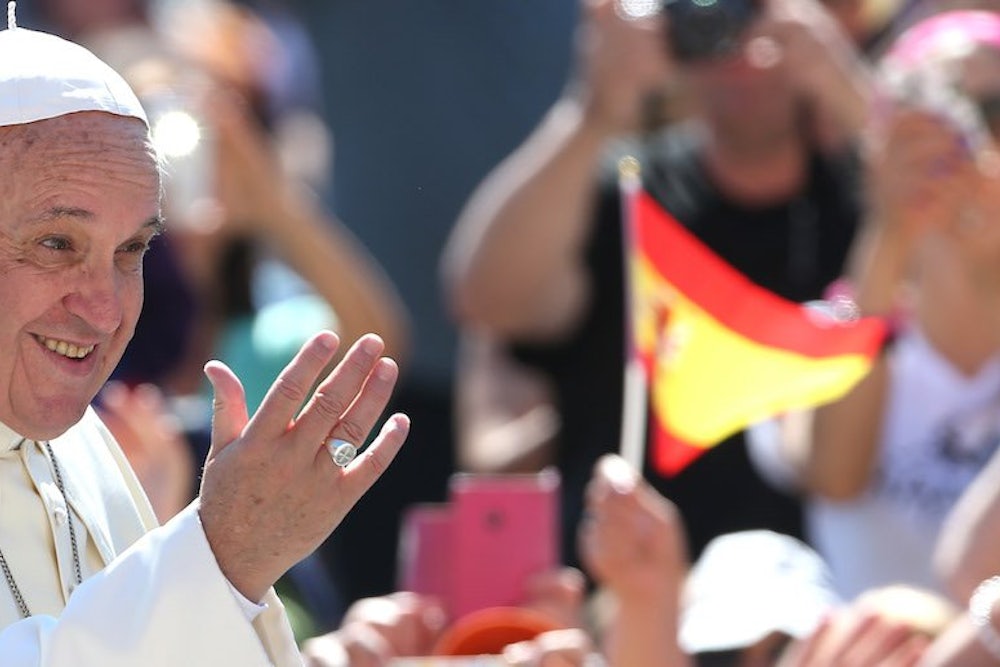If you pay much attention to the media in the coming weeks, you might find yourself wondering whether or not Pope Francis is a communist. Bad-faith political mislabeling of Francis is, by this early point in his papacy, already distressingly common: Rush Limbaugh has accused the pontiff of espousing Marxism and socialism, a pair of claims that Fox host Sean Hannity later echoed. These feverish charges arose as a result of several of Francis’ statements about the failures of trickle-down economics and the ravages of inequality. But the latest round of McCarthy-esque red-spotting is due to conservative nervousness about Pope Francis’ upcoming encyclical on the environment, expected to be released June 18.
Though yet unreleased, the encyclical has already engendered anxious rightward fretting about Francis’ socialist and/or Marxist tendencies from the National Review Online, Catholic journal First Things, and even the BBC, which featured a June 7 article declaring that “[Pope Francis] will be a polarising presence, and the question ‘Is the pope a communist?’ will really matter.”
There are several reasons why this question will never really matter, and an almost infinite plenitude of reasons it is an absurd one in the first place. For starters, those probing whether or not Pope Francis is himself a communist, socialist, or Marxist (these terms are interchangeable on the right) are not really interested in discovering what Francis’ own personal politics are. After all, that information is readily available. As longtime Vatican reporter John L. Allen wrote last week in a Crux essay on Francis’ forthcoming encyclical, “If you asked, [Francis would] probably tell you he comes out of the moderate wing of Argentina’s Peronist movement.” Biographies of Francis, including The Great Reformer by seasoned Catholic journalist Austen Ivereigh, have similarly turned up no evidence that Francis has ever held membership in any communist party.
But the pundits accusing Francis of communism do not really seem to view communism as a political orientation, wherein one advocates for reform through participation in routine political activities, like campaigning, fundraising, electioneering, and so on. This is because in the United States, there are only two partisan avenues to political impact: Republican and Democrat. The presence of any partisan communists in America is so vanishingly small that communism is instead interpreted as an ideological pose, specifically opposite of the pro-capitalist priors common to both Republicans and Democrats. In other words, you don’t have to actually partake in any communist politics to qualify as a communist in the United States, you just have to show insufficient satisfaction with capitalism.
Thus the question about Francis’ statements on politics is more a matter of determining their origin. When Limbaugh, Hannity and company angrily accuse Francis of crypto-socialism, what they mean to suggest is that his understanding of politics arises not from Christianity—a property to which the Fox brigade would prefer to lay monopolistic claim—but from some foreign atheistic ideology. This rhetorical sleight-of-hand forces Christian leftists into the unfair position of having to defend Francis’ Christian reasoning in opposition to left politics, when the relationship between the two is, in fact, far less antagonistic than the right would suggest.
Capitalism has no special affinity with Christianity, just as socialism is not reserved strictly for atheists. (Indeed, Christian socialist parties are common elsewhere in the world, and have enjoyed a powerful presence in the United States in past periods.) In fact, much of the philosophical underpinning of contemporary pro-capitalist arguments arose in direct opposition to traditional Christian teaching on property ownership. As Cambridge professor Peter Garnsey points out in his book Thinking About Property, Enlightenment luminary John Locke makes a fine test case: By claiming that virtually unlimited individual accumulation of private property was a natural right, Locke contradicted centuries of Christian writing on the nature and purpose of property, which identified it as a provisional and highly contingent civil right. (Unsurprisingly given this type of reversal, Locke was no fan of Catholics.)
Suspicion of the types of accumulation that characterize capitalism—including the massive build-up of wealth among a small number of unimaginably rich plutocrats—is therefore more common to Christianity than the unreserved embrace of the same that is now typical of American right-wingers. Rather than asking if Pope Francis’ positions on reducing inequality and protecting the environment are products of communism, it would be much wiser and more insightful to ask if conservative rejection of environmentalism and egalitarianism are really products of Christianity. This would at least provide context for the tidal wave of rueful tears that will undoubtedly follow the publication of Francis’ encyclical on the environment, which will rankle the pontiff’s critics not because Francis’ thought is communist, but because it is Christian.
